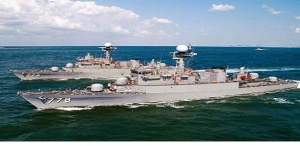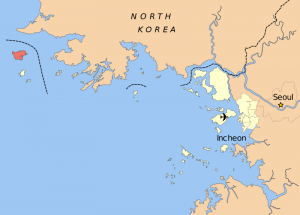Difference between revisions of "Cheonan sinking"
m |
m |
||
| Line 3: | Line 3: | ||
[[File:Cheonan.jpg|thumb|300px|Pohang Class corvettes of the ROKN]] | [[File:Cheonan.jpg|thumb|300px|Pohang Class corvettes of the ROKN]] | ||
| − | '''This article concerns the sinking of the South Korean Corvette 'Cheonan'''' on 26 March 2010 with the loss of 46 South Korean sailors. The event occurred about 1 nautical mile off the South West Coast of Baengnyeong Island in the Yellow Sea and close to the maritime border with North Korea. The island is dominated by a joint U.S.-Korean base for anti-submarine warfare (ASW) operations. The sea channel between Byeongnyeong and the North Korean coast is narrow enough for both sides to be in artillery range of each other. | + | '''This article concerns the sinking of the South Korean Corvette 'Cheonan'''' on 26 March 2010 with the loss of 46 South Korean sailors. The event occurred about 1 nautical mile off the South West Coast of Baengnyeong Island in the Yellow Sea and close to the maritime border with North Korea {{Maplink|37.929167,124.600556}}. The island is dominated by a joint U.S.-Korean base for anti-submarine warfare (ASW) operations. The sea channel between Byeongnyeong and the North Korean coast is narrow enough for both sides to be in artillery range of each other. |
[[File:Baengnyeong.png|thumb|300px|Baengnyeong Island shown in red]] | [[File:Baengnyeong.png|thumb|300px|Baengnyeong Island shown in red]] | ||
Revision as of 18:26, 23 July 2010
though be advised that the official narrative is particularly suspect.
This article concerns the sinking of the South Korean Corvette 'Cheonan' on 26 March 2010 with the loss of 46 South Korean sailors. The event occurred about 1 nautical mile off the South West Coast of Baengnyeong Island in the Yellow Sea and close to the maritime border with North Korea Map. The island is dominated by a joint U.S.-Korean base for anti-submarine warfare (ASW) operations. The sea channel between Byeongnyeong and the North Korean coast is narrow enough for both sides to be in artillery range of each other.
The event took place in the aftermath of the 11-18 March 2010 'Foal Eagle' Exercise, which included anti-submarine maneuvers by a joint U.S.-South Korean squadron of five missile ships. Mystery surrounds the continued presence of U.S. missile cruisers in the locality more than eight days after the ASW exercise ended.
U.S. Secretary of State Hillary Clinton claimed that there is "overwhelming evidence in favor of the theory that North Korea sank the South Korean Navy warship". She was referring to a brief, 5 page report of an investigation described as having been 'carried out by a team of international experts' (but who remain unidentified) and commissioned by the South Korean government, which was published on 20 May 2010 [1]. It's concluding paragraph states:
Based on all such relevant facts and classified analysis, we have reached the clear conclusion that ROKS "Cheonan" was sunk as the result of an external underwater explosion caused by a torpedo made in North Korea. The evidence points overwhelmingly to the conclusion that the torpedo was fired by a North Korean submarine. There is no other plausible explanation.
The North Korean Government have issued repeated categorical denials of any involvement in the sinking and threatened dire consequences if any punitive action is taken against North Korea as a consequence of their alleged involvement.
Development of the story of the sinking in the Western MSM has followed the usual pattern of reporting on matters involving countries that decline subservience to the Western world view. Such countries are routinely demonized as 'rogue states' part of an 'axis of evil' and generally ridiculed as beyond the pale of Western civilized values. Their version of events is at best reported briefly; at worst simply ridiculed. The Western interpretation is repeated ad nauseam and pariah status is thus reinforced. So it is with the sinking of the Cheonan; and yet there is solid evidence, quite apart from rigorous intuition, pointing to either a deliberate false-flag operation or a 'friendly fire' event blamed on North Korea for patently obvious geo-political reasons.
As ever, the question Qui bono? reveals facts and motivations which the official narrative does its best to minimise or conceal.
9 July 2010 update
Reported in Voice of America News on 9 July 2010 - US Professors Raise Doubts About Report on South Korean Ship Sinking [2]
References
External links
- Did an American Mine Sink South Korean Ship? - New America Media, 27 May 2010
- Beijing suspects false flag attack on South Korean corvette - Online Journal, 28 May 2010
- South Korea in the line of friendly fire - Kim Myong Chol - Asia Times 27 May 2010
- Pyongyang: Cheonan was false-flag sinking - Asia Times, 4 Jun 2010
- The Korean Crisis, Cui Bono? by F. William Engdahl
- Wikipedia main article

